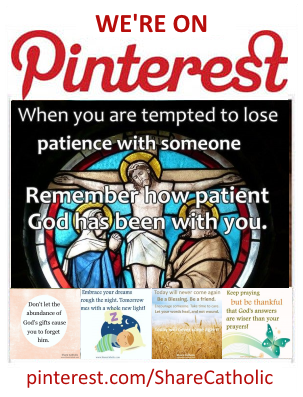
Salvation is a lifelong process. It might be recorded as starting on a definite date, but, for Catholics, it has started way back, has either faltered, or has advanced very slowly, at a healthy pace or moved into fruition rapidly (CCC 1229). For Catholics who have faltered or have advanced very slowly, and for Protestants, it may appear to have come as a decision later in life, and therefore, may be given a date.
Protestants consider conversion as a one time process which, for a period, moves forward at whatever pace it does, reaching a plateau in whatever time it takes. It is a cruise, thereafter, for most people. This is, of course, a wrong assumption. Additionally, the Protestant belief in the slogan: ‘once saved, always saved’ is also erroneous. The Catholic Church, “the pillar and foundation of truth” (1 Timothy 3:15), teaches that salvation may be lost, and that conversion is a constant effort lasting a lifetime. Let us prove it, using the Bible; the underlined (above and in the paragraph below) being the headings to be dealt with:
Salvation can be lost because God has given us free will, and consequently, we can turn our backs on the Lord (God forbid) anytime we wish. If we ignore the prompts of the Holy Spirit in us (CCC 851) and listen consistently to the prompts of our flesh, or those of the devil, we will fall. We need knowledge of God and knowledge of His will if we are to have strong faith to discern and then resist the bad prompts; strong faith that we may persevere under hardship and during tribulation which the devil is sure to provide us with, as promised by the Word of God. The key word here is ‘persevere’. The moment we lose hope, all is lost. Never, never, never lose hope! The Lord is always near, and in plenty more than one way: Romans 10:8; Ephesians 2:13; Philippians 4:5.
- A. Salvation can be lost because God has given us free will. Best of all is a quote by Moses, and a few from the Book of Sirach, from the Old Testament, and lastly, from the teaching of the Church; from the Catechism of the Catholic Church:
Deuteronomy 30: 19 I call heaven and earth today to witness against you: I have set before you life and death, the blessing and the curse. Choose life, then, that you and your descendants may live,
Sirach 15: 14 When God, in the beginning, created man, he made him subject to his own free choice. 17 Before man are life and death, whichever he chooses shall be given him…20 No man does he command to sin, to none does he give strength for lies.
1 Timothy 5: 15 For some have already turned away to follow Satan.
The necessity of faith
CCC 161: Believing in Jesus Christ and in the One who sent him for our salvation is necessary for obtaining that salvation.42 “Since “without faith it is impossible to please [God]” and to attain to the fellowship of his sons, therefore without faith no one has ever attained justification, nor will anyone obtain eternal life ‘But he who endures to the end.’”43
Perseverance in faith
CCC 162: Faith is an entirely free gift that God makes to man. We can lose this priceless gift, as St. Paul indicated to St. Timothy: “Wage the good warfare, holding faith and a good conscience. By rejecting conscience, certain persons have made shipwreck of their faith.”44 To live, grow and persevere in the faith until the end we must nourish it with the word of God; we must beg the Lord to increase our faith;45 it must be “working through charity,” abounding in hope, and rooted in the faith of the Church.46
Footnotes:
42 Cf. Mark 16:16; John 3:36; 6:40 et al.
43 Dei Filius 3:Denzinger-Schonmetzer 3012; cf. Matthew 10:22; 24:13 and Hebrews 11:6; Council of Trent: Denzinger-Schonmetzer 1532.
44 1 Timothy 1:18-19.
45 Cf. Mark 9:24; Luke 17:5; 22:32.
46 Galatians 5:6; Romans 15:13; cf. James 2:14-26.
God has given us free will so that our love for Him might take us to Him without coercion. Try to recall the words of Jesus, our Lord, and see how He is always advising us, showing us the way and never ordering us to do anything. Of course, there are commandments and precepts and all, but, they come into play after we make our decision to follow Him and become His disciples.
So, in our free will, we are subject to three prompts: that of the Holy Spirit (Romans 5:5; and CCC 851), that of the flesh (Matthew 26:41) and Satan’s (John 13:2). Learning to distinguish between these prompts is the key to walking in the footsteps of Christ. This key is based on acquiring knowledge of the will of God. The prompts of the Holy Spirit and those of the flesh are discussed together, first. Paul:
Romans 8: 5 For those who live according to the flesh are concerned with the things of the flesh, but those who live according to the spirit with the things of the spirit. 6 The concern of the flesh is death, but the concern of the spirit is life and peace. 7 For the concern of the flesh is hostility toward God; it does not submit to the law of God, nor can it; 8 and those who are in the flesh cannot please God. 9 But you are not in the flesh; on the contrary, you are in the spirit, if only the Spirit of God dwells in you. Whoever does not have the Spirit of Christ does not belong to him. 10 But if Christ is in you, although the body is dead because of sin, the spirit is alive because of righteousness. 11 If the Spirit of the one who raised Jesus from the dead dwells in you, the one who raised Christ from the dead will give life to your mortal bodies also, through his Spirit that dwells in you. 12 Consequently, brothers, we are not debtors to the flesh, to live according to the flesh. 13 For if you live according to the flesh, you will die, but if by the spirit you put to death the deeds of the body, you will live.
And, the following are scriptural evidence of the three prompts that are in us:
- 1. The Prompt of the Holy Spirit:
Romans 5: 3 Not only that, but we even boast of our afflictions, knowing that affliction produces endurance, 4 and endurance, proven character, and proven character, hope, 5 and hope does not disappoint, because the love of God has been poured out into our hearts through the holy Spirit that has been given to us.
CCC 851 Missionary motivation. It is from God’s love for all men that the Church in every age receives both the obligation and the vigor of her missionary dynamism, “for the love of Christ urges us on.” Indeed, God “desires all men to be saved and to come to the knowledge of the truth”; that is, God wills the salvation of everyone through the knowledge of the truth. Salvation is found in the truth. Those who obey the prompting of the Spirit of truth are already on the way of salvation. But the Church, to whom this truth has been entrusted, must go out to meet their desire, so as to bring them the truth. Because she believes in God’s universal plan of salvation, the Church must be missionary.
- 2. The Prompts of the Flesh:
Matthew 26: 41 Watch and pray that you may not undergo the test. The spirit is willing, but the flesh is weak.
- 3. The Prompts of the Devil:
John 13: 2 The devil had already induced Judas, son of Simon the Iscariot, to hand him over. So, during supper…
James 4: 7 So submit yourselves to God. Resist the devil, and he will flee from you.
1 Peter 5: 8 Be sober and vigilant. Your opponent the devil is prowling around like a roaring lion looking for (someone) to devour. 9 Resist him, steadfast in faith, knowing that your fellow believers throughout the world undergo the same sufferings.
- B. We have been promised hardships and persecution:
Mark 10: 29 Jesus said, “Amen, I say to you, there is no one who has given up house or brothers or sisters or mother or father or children or lands for my sake and for the sake of the gospel 30 who will not receive a hundred times more now in this present age: houses and brothers and sisters and mothers and children and lands, with persecutions, and eternal life in the age to come.
Luke 9: 23 Then he said to all, “If anyone wishes to come after me, he must deny himself and take up his cross daily and follow me.
2 Timothy 3: 12 In fact, all who want to live religiously in Christ Jesus will be persecuted.
- C. The conversion process is a lifelong experience:
Philippians 1: 6 I am confident of this, that the one who began a good work in you will continue to complete it until the day of Christ Jesus.
1 Thessalonians 5: 24 The one who calls you is faithful, and he will also accomplish it.
2 Corinthians 4: 16 Therefore, we are not discouraged; rather, although our outer self is wasting away, our inner self is being renewed day by day.
Pope John Paul II’s Redemptoris Missio 47: Certainly, every convert is a gift to the Church and represents a serious responsibility for her … especially in the case of adults, such converts bring with them a kind of new energy, an enthusiasm for the faith, and a desire to see the Gospel lived out in the Church. They would be greatly disappointed if, having entered the ecclesial community, they were to find a life lacking fervor and without signs of renewal! We cannot preach conversion unless we ourselves are converted anew every day.
These are the teachings of the Church on Conversion, through the Catechism of the Catholic Church:
CCC 1435: Conversion is accomplished in daily life by gestures of reconciliation, concern for the poor, the exercise and defense of justice and right, by the admission of faults to one’s brethren, fraternal correction, revision of life, examination of conscience, spiritual direction, acceptance of suffering, endurance of persecution for the sake of righteousness. Taking up one’s cross each day and following Jesus is the surest way of penance.
CCC 1436: The Eucharist and Penance. Daily conversion and penance find their source and nourishment in the Eucharist, for in it is made present the sacrifice of Christ which has reconciled us with God. Through the Eucharist those who live from the life of Christ are fed and strengthened. “It is a remedy to free us from our daily faults and to preserve us from mortal sins.”
CCC 1439: The process of conversion and repentance was described by Jesus in the parable of the prodigal son, the center of which is the merciful father: the fascination of illusory freedom, the abandonment of the father’s house; the extreme misery in which the son finds himself after squandering his fortune; his deep humiliation at finding himself obliged to feed swine, and still worse, at wanting to feed on the husks the pigs ate; his reflection on all he has lost; his repentance and decision to declare himself guilty before his father; the journey back; the father’s generous welcome; the father’s joy – all these are characteristic of the process of conversion. The beautiful robe, the ring, and the festive banquet are symbols of that new life – pure, worthy, and joyful – of anyone who returns to God and to the bosom of his family, which is the Church. Only the heart Of Christ Who knows the depths of his Father’s love could reveal to us the abyss of his mercy in so simple and beautiful a way.
CCC 1490: The movement of return to God, called conversion and repentance, entails sorrow for and abhorrence of sins committed, and the firm purpose of sinning no more in the future. Conversion touches the past and the future and is nourished by hope in God’s mercy.
CCC 1888: It is necessary, then, to appeal to the spiritual and moral capacities of the human person and to the permanent need for his inner conversion, so as to obtain social changes that will really serve him. The acknowledged priority of the conversion of heart in no way eliminates but on the contrary imposes the obligation of bringing the appropriate remedies to institutions and living conditions when they are an inducement to sin, so that they conform to the norms of justice and advance the good rather than hinder it.
CCC 2784: The free gift of adoption requires on our part continual conversion and new life.






